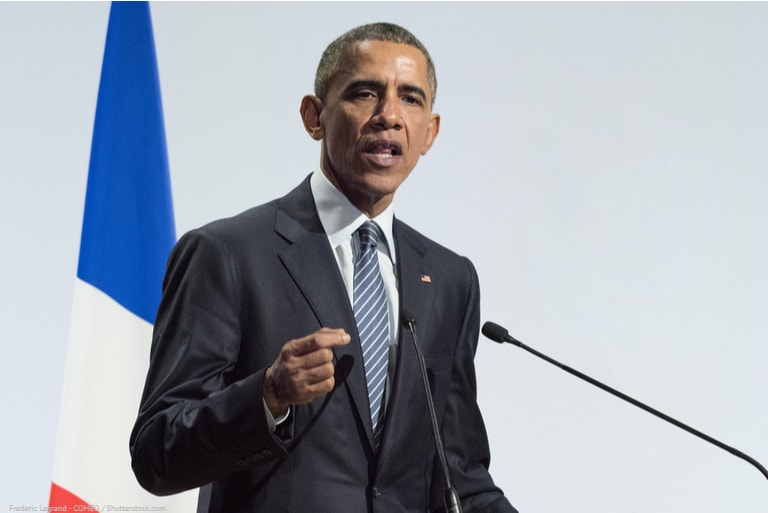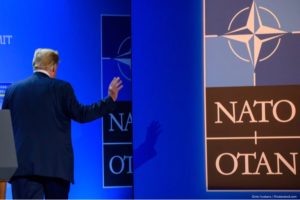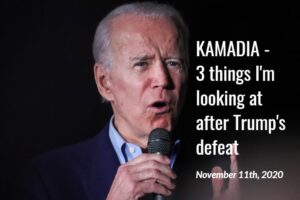Nick Lehr interviews David Bromwich, Yale University
A decade ago, in October 2009, Barack Obama learned that he had won the Nobel Peace Prize. He was uncomfortable with the prize, saying that he didn’t feel that he deserved “to be in the company of so many of the transformative figures who’ve been honored by this prize.”
Nonetheless, he added that he would “accept this award as a call to action,” noting “the growing threat posed by climate change” and the responsibility he had “for ending a war.” But by the time Obama arrived in Oslo to accept the prize two months later, he had approved a 30,000 troop surge in Afghanistan, dashing any hopes that the anti-war candidate would reverse the militarism of the Bush administration. By the end of his second term, Guantanamo Bay – the closing of which he had made a cornerstone of his first presidential campaign – remained open.
In his recently published book, “American Breakdown,” Yale Sterling Professor of English David Bromwich is unsparing in his assessment of Obama’s legacy.
“He has spoken more words, perhaps, than any other president,” Bromwich writes, “but to an unusual extent, his words and actions float free of each other.” In some circles, criticism of Obama can be complicated by the fact that, as Bromwich wrote in 2015, Obama’s “predecessor was worse, and his successor most likely will also be worse.” To Bromwich, this has proved correct. “Trump,” he told me, “is by far more dangerous to the country, to the constitutional system of the United States, than any president we have ever had.”
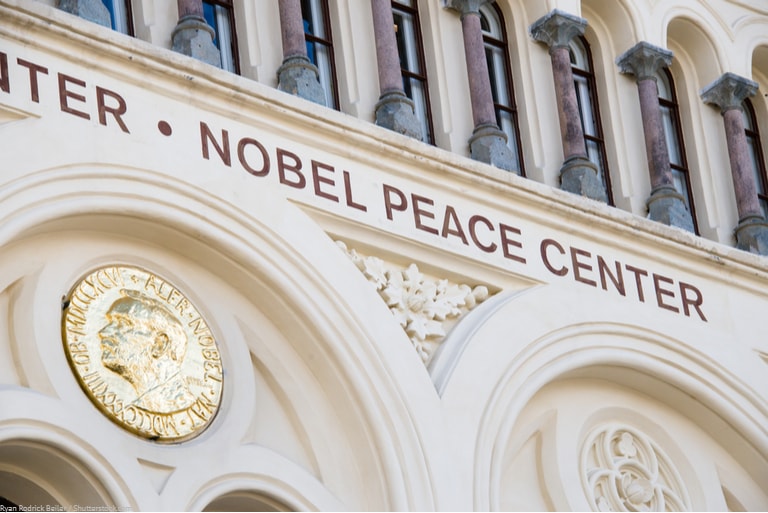
But in an interview, which has been edited for length and clarity, Bromwich details how Obama – despite the figure he cut, the values he espoused and the change he symbolized – was the wrong president for the wrong time, and one particularly unprepared to live up to the ideals of the Nobel Peace Prize.
I want to start by going back to the early stages of the 2008 campaign. What did voters who supported Obama think they were getting?
In the primaries, Obama pledged to filibuster any bill that promised amnesty to the telecommunications companies for warrantless data collection on the American public. He repeatedly promised to close Guantanamo. He called it a stain on the honor of the United States.
I think more largely, he was seen as the anti-war candidate. He was going to withdraw the United States from these overextended, violent commitments abroad.
And, of course, he also promised to be the one who would help solve the financial collapse and its effects in a way that was not going to favor the big banks, the large money interests.
On all of those commitments, to one degree or another, he reneged. He never closed Guantanamo. The numbers of prisoners were decreased. But there are still scores of them, who have no prospect of release, and they’re now talking about creating an old age unit, so people captured at the age of 30 will die in Guantanamo.
What were some of the early signs that those hoping for an anti-war president would be sorely disappointed?
Well Obama held onto [Bush appointee] Robert Gates as secretary of defense. That was not a necessary move by him. It more or less ensured that the wars would go on. Gates was by no means extreme, but he’s a firm believer in American global military reach.
The appointment of Hillary Clinton as secretary of state was the largest single indication of this, though. During the campaign, Obama had disagreed strongly with Hillary Clinton on foreign policy. Then he appointed her as secretary of state.
The first Obama administration – the cabinet of 2009 to 2013, roughly speaking – was like a third Clinton administration. And I still don’t quite know why he did it. People have said that the Clintons would have formed a second pole of the Democratic Party, that they would have undermined Obama, and he needed to make friends with them.
I was never convinced by that. I think it’s just a very general tendency to placate on his part, and it had big consequences for the future of Syria, Ukraine, Libya and elsewhere.
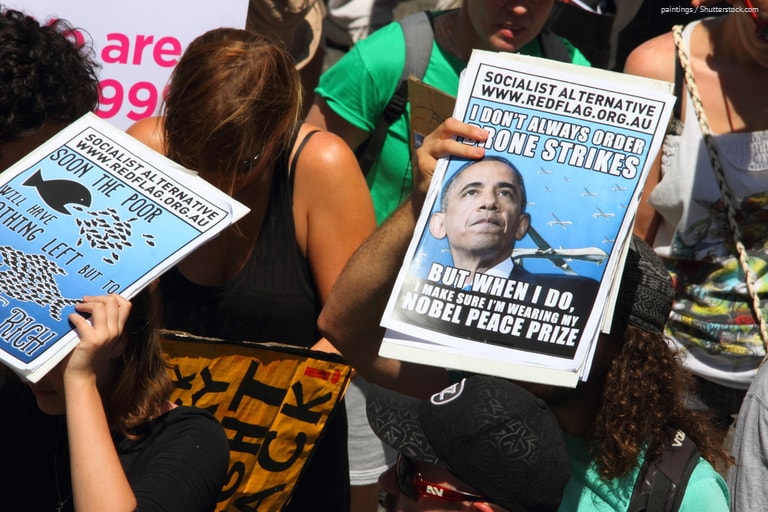
What didn’t the Nobel committee understand about Obama – or about this particular moment in American politics – when they decided to award him the prize?
Keep in mind the Nobel Peace Prize was won by Henry Kissinger, so there have been people who are destroyers of the peace who have succeeded in winning the prize.
Obama’s way of speaking had certainly caught people’s attention – his so-called “soaring eloquence,” which must have been used to describe him a thousand times. He had already been made into a world famous figure, even beyond what previous presidents had been. So he was given the prize in the hope that he would do something to deserve it.
But from the start, Obama was under concerted attack – by Dick Cheney, most of all – but also other Republicans, like Lindsey Graham. They were saying that Obama was going to be weak in his opposition to terrorism and that his promises about closing Guantanamo were a giveaway.
By May of 2009, Obama was already conceding that there were certain detainees at Guantanamo – those “who cannot be prosecuted yet who pose a clear danger to the American people” – who would have to remain in a state of limbo. Why didn’t Obama stand firm?
Obama doesn’t like conflict. He has a smooth manner and an agreeable manner and a decent disposition. I think if you tell young people to look at Obama as an ideal of a president – you know, he looks like a president. He’s an admirable sort of model.
But his temperament was really better for a president in peaceful times, when there was comity between the parties. Temperamentally, you could say he most resembles Dwight Eisenhower. Obama would have been a good Democratic president in the 1950s, when everything was going all right between the two parties and the United States hadn’t made exorbitant and dangerous commitments abroad.
Because Obama had no experience with the military, I think he was probably overwhelmed by military advice, and thought he should give in to it to some extent, just to prove that he wasn’t weak. That’s unfortunate. But that was his pattern.
And yet “not looking weak” – in other words, assenting to war – is, in a lot of regards, for an American president, the easiest thing to do.
Yes. We default to war. Take Trump’s decision in April 2017 to send those 60 Tomahawk missiles to bomb a Russian airfield in Syria. That didn’t lead to a larger war, but he was praised vastly for it by most in the liberal media, as well as the usual suspects, like Lindsey Graham. Why? Because he had used U.S. power. He had finally bombed. And it does occur to you, eventually, that for an American president, bombing is easier than thinking.
Obama is not, again, by nature, a violent, contentious sort of person. But with Libya, for example, when he was told by Samantha Power, Susan Rice, Hillary Clinton and Anne-Marie Slaughter that we needed to fight with the rebels in Libya, bomb the country and overthrow Gadhafi, he must have felt that he shouldn’t resist. And the civil war in Libya that resulted – well, it continues today.
That reminds me of the part of your book where you zero in on comments Obama made in March 2015 about his failure to close Guantanamo. Obama said, “The politics of it got tough, and people got scared by the rhetoric around it. Once that set in, then the path of least resistance was just to leave it open.” How does that one phrase – “the path of least resistance” – epitomize Obama’s approach to politics?
Many people thought Obama had done quite confrontational, quite remarkable things somewhere back in his career. Maybe it happened at Harvard, maybe it happened in his time as a community organizer. But when you look closely, these occasions don’t exist.
Strength of character is established by doing something brave and original. You’ll find this idea in places like Emerson’s essay “Self-Reliance” – you are stronger from habit, from having once seen that you’ve been strong. That has to evolve by taking a stance of open resistance, and maybe once or twice even being alone in opposition and facing the powers that be. Well-meaning politicians like Obama, who haven’t had that particular experience, are, in a sense, unformed and unprepared to serve in positions as leaders.
[Back in 2014], when I wrote an article critical of Obama’s presidency, I received a note from a community worker involved in Chicago politics. He told me about a time when he was working to get a serious gun control measure passed in the Illinois state legislature, sometime in the late-1990s, [when Obama was a state senator]. Obama had pledged his support for the gun control bill, and he said he would come to the committee hearing. And this man wrote that when the day came, they were taking a terrible beating. A ballistics expert they had put on the stand was getting raked over by the Republicans – there was some shouting, and so on. And as this was happening, he saw State Senator Obama walk past the room, stop at the door, look in for a second – and then walk away.
The community worker confronted Obama a few days later. “We were counting on your support,” he said, “and it mattered that you weren’t there. Why didn’t you come?” And Obama said, “Well, I just looked in, and I saw a lot of angry talk and shouting, and I just thought I had a better way to spend my time.”
So that’s it. That’s the path of least resistance. That anecdote sort of crystallizes it.
Obama entered office in 2009 with a majority that Democrats today can only dream of: 59 seats in the Senate and a big majority in the House. What, in your view, was the Democrats’ biggest lost opportunity?
I still look back with some sadness on those years, especially on the score of climate change.
It wasn’t a politically valuable issue. His team took the measure of health care versus climate change in 2009, and they decided health care was more ripe for the public.
Obamacare was the triumph of his domestic policy, and it certainly was the hardest fought battle that ended in a sort of victory during his eight years of domestic policy, as the Iran Nuclear Agreement was the strongest achievement he had in foreign policy.
Still, it just seems to me too much time went into Obamacare – 15 months of his presidency were preoccupied with that. And then he was looking down the barrel of a gun, the midterm election, where he lost his majority in Congress. That mattered.
He never came back to climate change. I think one of the most disappointing and really weak utterances of his whole presidency, was when, again and again, during the 2012 campaign, he said that we could have all of the above – fracking, fossil fuels, solar and wind – we can have all of them. Well, that’s a terrible cop-out. I think Obama believed it would be reassuring to people. He couldn’t resist saying that reassuring thing.
Yes, he wasn’t prompted enough by the sense of urgency that we now have. He didn’t have the most recent United Nations climate report, which is the worst news so far. But he knew plenty.
That was a deep lost opportunity. He knew better, and knows better. I see one of his latest tweets praises Greta Thunberg.
Well, yes. But she’s not president of the United States.
David Bromwich is Sterling Professor of English at Yale University
Note: The views expressed in this article are the author/s, and not the position of Intellectual Dose, or iDose (its online publication). This article is republished from The Conversation under a Creative Commons license.
